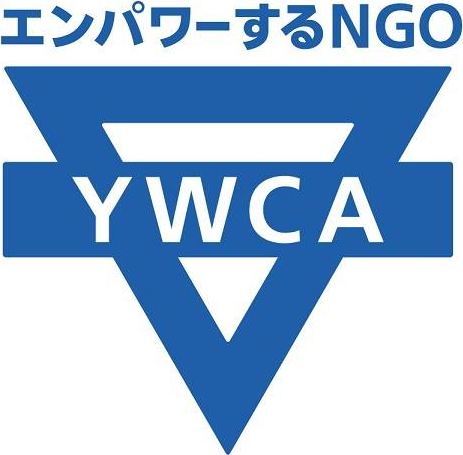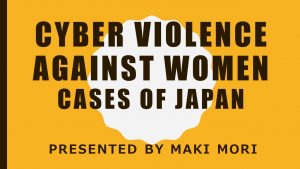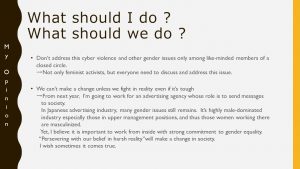少し前ですが、昨年の12月に開催された香港YWCA100周年ユースフォーラムで名古屋YWCA会員の森麻貴さんが日本代表として登壇しました。
本会のテーマは「21世紀におけるジェンダー平等:女性に対するサイバー暴力」。世界各国のYWCAから100名近くの方がWEB上で参加したこの会で、森さんは全文英語でスピーチを行いました。日本のネット空間で起こるジェンダーに基づく暴力について触れ、問題提起を行っています。
ジェンダー平等や女性差別については、先般の元東京オリンピック・パラリンピック組織委員森会長による残念な発言などをきっかけに国内でも大きな注目を集めているところですが、本内容は改めて考えるきっかけになる内容だと思います。
長いですが全文提供していただいたので、英語スピーチと日本語訳を掲載いたします。英語学習も兼ねてお読みいただきましたら幸いです。
ご感想等ございましたら是非お聞かせ下さい!
(以下、スピーチ本文)
My talk about cases of japan is divided into 4 parts.
I’ll start by talking about JK business and Sugar daddy that are dating services that hire teenage girls.
After that, I will introduce to you pornography in Japan.
Next, I will talk about revenge porno and cyberstalking in Japan.
Finally, I will introduce to you the present situation in Japan where saying #MeToo is risk.
To begin with let’s address JK business and Sugar daddy.
Have you ever heard “JK”? JK stands for Joshi Kosei means high school girls in Japanese.
JK business is various services by mostly teenage girls wearing a high school uniform. Mostly girls use social media, so girls are recruited through it, However, not always informed about what they are going to do and forced to provide sexual services in some cases.
The same applies to Sugar daddy. Sugar daddy is the act of women and girls receiving money from a man in return for dating or having sexual relationship with.
And the Coronavirus is affecting girls. The number of women and girls who are involved in this dramatically increased because of economic distress during COVID19.
These business are very dangerous for girls and women, so in Japan there are laws and ordinances that protect teenagers to be sexually exploited.
However, it is not easy to make a prosecute, because the contracts are individual bases through social media.
まずは、JKビジネス、パパ活について見ていきます。JKとは女子高生の略称です。主に10代の少女たちが制服を着て、デートをするなど様々なサービスを行います。また、JKビジネスの業者が少女たちとSNSで繋がり、半ば騙しながらビジネスの道に彼女たちを誘う事例も多く見受けられます。彼女たちがそこでどんなことをするのかは全く教えられずに勧誘される場合も多く、性的なサービスを強いられることもあり、危険な状況と隣り合わせなのです。
そして、デートや性的な関係を持つ代わりに男性からお金をもらう行為をパパ活と言います。パパ活もJKビジネス同様に危険な目に遭う場合が多くなっています。また、コロナ禍で経済的に困窮した女性たちがパパ活をして、性被害に遭うケースが社会的にも問題になっており、NHKクローズアップ現代にも取り上げられていました。日本では、各自治体で10代の少女たちを性的搾取や性被害から守るための条例が出されています。例えば、愛知県は「JKビジネス包括的規制条例」を定めています。しかし、法律や条例が制定されているからといって少女たちや若い女性たちが性被害から守られているとは言えません。SNSの普及により、これらの行為は個人的に行われることが多くなったため、被害を受けても声を上げづらいのが日本の現状です。
Next, I will talk to you about pornography in Japan. Japan is known for the huge porn industry and the international police has been especially paying attention on child pornography in Japan. Of course, there is the law that protect children to Child Pornography, but Comics, Anime, CG, and false child pornography are excluded. And, recently, pornography used new technology became a social problem. This technology is called Deepfake, that is swapping the faces of actresses in the original pornography with those of female celebrities. In this year,two men were arrested on a charge of it. In Japan, The national institute of informatics is developing technology to automatically identify deepfake.
次に、日本のポルノについてお話しします。日本は世界の中でもポルノ産業が有名で、児童ポルノに関して言えば国際警察にマークされていると言う驚きの事実もあります。もちろん国内では児童ポルノ禁止法が制定されているが、漫画、アニメ、CGなどは対象外となっており、アニメ大国日本においてはアニメや漫画などによって少女が性的に描かれることが多いため、この点は問題と言えます。
また、最近では「ディープフェイク」と呼ばれる新たな技術を使ったポルノが問題となっています。これは、動画を編集して違う人の顔を使ってポルノを作ってしまう技術です。女性有名人の写真や動画が勝手に使用され、このディープフェイクに使われてしまう事件が多発しています。世界的に問題となっていますが、日本でも今年、エンジニア職の男と男子大学生の2人がこの件で逮捕されています。また、国内では国立情報学研究所がこのディープフェイクを特定する技術を開発しようとしています。
Next, I will talk to you about revenge pornography and cyber stalking. Revenge pornography is distribution of sexually explicit images or videos of individuals without their consent. In some case, images or videos are used for creating deepfake contents. And, cyberstalking is also a serious issue in Japan. In February 2020, the man who broke into a girl idol’s house and committed sexual crime were arrested. And his criminal method is really shocking. That is he identified her house with the hint that is the scenery around her house reflected on her eyes from the photo uploaded on her social media.
次に、日本でのリベンジポルノ、ネットストーカーについて紹介します。リベンジポルノとは、相手の了承なしに相手のヌード写真など性的な写真や動画をネット上に上げる行為のことです。元々交際関係にあった男女に多く見られ、別れた腹いせに相手を傷つけるために行う性暴力の一種です。まれに、前述したディープフェイクに悪用されてしまうケースもあり、とても問題になっています。
そして、ネットストーカーも社会的に問題となっています。今年2月、女性アイドルの自宅に侵入し、猥褻な行為を行なったとして男が逮捕されていますが、この男の犯行手口が驚きのものとなっています。この男は、被害に遭った女性アイドルが自身のSNSに上げていた自撮り写真の瞳に写っていた風景から家を特定したのです。なんとも驚愕な手口で、改めてSNSの危険性を思い知らされる事件でした。
And, I will introduce to you other cases. In Japan, sexual harassment on female athletes became a subject of discussion. There are many photos of female athletes where their chest and lower parts of body are intentionally zoomed and spread online. And also, there are cases of direct messages attached with the picture of male genital organs being sent to the athletes, and photo of athletes where semen are spilled over, being spread online There are specific measures taken against this case. For example, Sports organization released a document and set up reporting form on their website to enable people to file such sexual harassment against female athletes online.
そのほかのケースを紹介します。日本では、女性アスリートに対する性的な嫌がらせが横行しています。ネット上には女性アスリートの胸や下半身を拡大した写真がたくさんアップロードされていたり、また女性アスリートのSNSアカウントに男性器の写真がDMで送られてきたり、女性アスリートの写真に精液をかけた写真がネット上に拡散していたり、ととんでもない事件が日々たくさん起こっています。これに対して、JOC(日本オリンピック委員会)をはじめとする様々なスポーツ団体がアスリートへの写真・動画による性的ハラスメント防止の取り組みについて」という文書を発表し、性的目的のSNS投稿やWEB掲載の情報提供を求める報告フォームをHPに設置するなど、本格的な対策に乗り出している。
Next, I will talk to you about Japanese bad custom. Japanese is critical of people who raise voice against sexual violence.
To give an example, Shiori Ito. She accused the sexual assault. For that she was criticized to the level where she was no longer able to live in Japan.
Why do you think did they criticized her ? Japanese has the custom that for women to give her opinions in public is against the social norms. So, many Japanese women or Japanese don’t even understand “what is the problem?” ,and they don’t know many issues ,because especially gender issues are covered up behind the scenes.
Of course, there are some laws established to protect the victims including the crime of rape (強姦罪) anything else, but these require a (formal) complaint from the victim for prosecution.
日本はなぜこんなに性暴力に対して声を上げづらいのでしょうか?例えば、日本の#MeToo運動を代表とする伊藤詩織さんは、自身の性被害を訴えたところ日本では住めないほどの批判をされました。性被害を訴えることは、精神的にとても辛く、彼女の行為は勇気ある行動なのに、なぜここまで批判されるのでしょうか?日本には「意見を持たず意見を主張しない女性が理想」という文化があります。だから、女性はその理想に近づくためにできるだけ意見は控えめにするようになります。その結果、意見を持っている女性、意見を主張する女性は疎まれ、声を上げづらくなる。と同時に、女性が声を上げないので、特にジェンダー課題については公で語られることが少なくなり闇に葬られてしまう。よって、「そもそも何が問題だっけ?」「あれ、なんか問題なんてあったっけ?」といった意見が多くなってしまします。法律的なことでお話しすると、もちろん日本には強姦罪やリベンジポルノ禁止法など、これまでお話ししてきた数々の性暴力に関する法律が制定されています。しかし、これらは全て親告罪なので、被害者が自分で被害を声に出さない限り何も始まらないのです。女性が意見を持つことを疎まれ(何時代だよ)声を上げる土台ができていないのに、ましてや日本は性的な話をタブー視する文化が色濃く残っているのに、性被害を訴えることなんて難しすぎます。
Next, I will talk to you about YWCA of Japan advocacy. We have a lot of programs to raise voice against gender issues. Let me give you examples of what I did in this year.
日本各地のYWCAでは、ジェンダー課題に対して声を上げる様々な活動がなされています。
First of all, we held online chatting gathering. This program was intended to anyone under 35 years old and there you can learn ”SRHR” throughout the series (4 times) Every time, guest speakers were invited to give lectures. The subjects of each time are ①Birth control pill and working style②Who does unpaid house works and care works?③Let’s think about LGBT and gender-based discrimination from working settings④Faith and gender/sexuality.
日本YWCA日韓ユースカンファレンス主催で、今年の8〜11月にオンラインおしゃべり会を開催しました。毎回お呼びしたゲストスピーカーの講演を聞き、35歳以下のユースが自由に意見を交換するセーフスペースを設け、SRHRについて学ぶブログラムでした。全4回行ったのですが、一回目が「低用量ピルと働き方」、二回目が「逃げ恥から見る家事労働」、三回目が「労働環境から考えるLGBTと性差別」、四回目が「信仰とジェンダー/宗教」でした。
Secondly, I will talk about workshops for high school and junior high school students.
We have been conducting leadership trainings toward students with the World YWCA’s global “RiseUp!” guide.
We look some cases that match the subject, and discuss about it and human rights around it with them.
In this year, we discussed about Social media and our human rights and ”What is gender?” through different kinds of medias.
We are planning next year’s workshop that deal with “partnership and SRHR”.
京都YWCAでは、中高YWCAにWSを行っています。今年のテーマは「メディアとジェンダー」。ジェンダー規範の決定に大きな影響力を及ぼしているメディアについて、炎上した広告や逆に称賛された広告を見ながら、「ジェンダー視点」を養う内容を行いました。
So far, I have shown cyber violence against women cases of Japan and YWCA of Japan advocacy.
Now, let me touch on my opinion.
Do you know the Global Gender Gap Report 2020 of Japan ? The answer is on this page. Japan ranks low in that ranking.
And, behind this Japan’s low performance in gender equality ranking is their attitude “taking peace for granted”. Most of Japanese have custom, ”If you can‘t beat them, join them” They think ”I feel gender-based violence sometimes, but I don’t want to speak about it because it’s easier not to”.
And, many Japanese don’t take gender issues and human rights violations as personal issues. There are a lot of such a person also around me. I think Japan’s gender gap ranking will not go up unless we start to seriously take them.
And, actually, we have few opportunities to think about human rights or gender in public education systems. We learn about biological sexuality educations, like ” the birth of life”, but most of us don’t learn comprehensive sexuality educations for example partnership or SRHR.
日本の2020年度ジェンダーギャップ指数は121位。なぜここまで低いのでしょうか?
それには、問題に気づかない「平和ボケ」している人が多すぎることに理由があると思います。日本には、「長い物には巻かれろ」と昔から言われてきています。これは、強い権力を持つ人にはたてつかずに従っていた方が良いという意味のことわざです。このように、例えばジェンダー課題のように問題が山積みでも、権力者に不利になることは社会の人々は言いません。日本の会社役員や政治家たちはトップが大体男性で、男性優位社会です。ですから、問題があったとしても言わない方がことを荒立てないので声を上げる人が少ないのです。
そんな状況ですから、日本の人はジェンダー課題を自身の問題だと捉えません。まずはそこの意識を変えていかないことには、なかなかジェンダーギャップ指数は上がらないでしょうね!!!!!
また、日本の性教育も不十分で、生物学的な性教育は受けますが、SRHRなどといった人権と合わせて教えられる機会はとても少ないのです。性教育の内容は学校や教師に一任されているので、性教育に熱心な先生(私は中高生時代、そんな素敵な先生に会ったことないですけど)に出会わない限り、十分な性教育は受けられないのです。
最近では、民間の団体が性教育についてSNSにあげたりしていますが、政府レベルで見るとほとんど変化のない状況です。
Then, what should we do ?
Firstly, I think it is important not to address this cyber violence and other gender issues only among like-minded members of a closed circle, because not only feminist activists, but everyone need to discuss and address this issue. So, we should make chances that everyone think and discuss about these issues and human rights.
Secondly, we should fight in reality even if it’s tough. In my case, from next year, I’m going to work for an advertising agency whose role is to send messages to society. And, In Japanese advertising industry, many gender issues still remains. Yet, I believe it is important to work from inside with strong commitment to gender equality.
I think “Persevering with our belief in harsh reality” will make a change in society.
Finally, I think “We need to hear voices on the other sides” The other sides means like a person who attack feminists.
Of course, Gender-based discriminations must not be allowed, but we need to think “Why do they do that?”, “ Why did they say that ?” If we think about it, we might discover new ideas.
Then, we should keep in mind that our values and ways of thinking are different, so we can’t always agree other values and perspectives, but it is important to try to empathize with them.
I think If we do it we can make gender equality society.
それでは、私たちは社会を変えるためにはどうしたらいいのでしょうか?
まず、私はジェンダーに関する議論を内輪で終わらせないことが大事だと思います。だって、ジェンダーのお話は私たちだけの話じゃないし、社会全体で考えていく必要があるものだからです。だから、私たちができること、しなければいけないことは、声を上げ続けること。そして、ジェンダー課題や人権について語る場を増やしていくこと。
そして、それらにも繋がることですが、どんなに辛くても現実の中で戦わなければ変化は起きません。もちろん、無理して我慢する必要はないですけど、でもほんのちょっと我慢も必要です。今の時代は、まだこんなんですけど、昔よりかはジェンダーの話がしやすくなっていると思います。それも昔の人がどんなに辛くても諦めずに声を上げ続けてくれたおかげ。だからこの声は途絶えさえちゃダメなんです。それに辛くなっても、きっとどこかに同じ思いをして頑張っている人がいるから心配しないでください。
そして、最後に、ジェンダーに興味のない人、ジェンダー差別をする人の声も聞くべきだと思います。もちろん、ジェンダー差別は決して許されません。だけど、「どうしてあの人はそんなことするんだろう?」「どうしてあんな発言をしたの?」と相手の言動の理由を考えることも必要だと思います。そうすれば、また別の問題が洗い出されるかもしれないし、新しいアイデアも生まれるかもしれない。人は異なる意見や価値観を持っているので、完全に相手を理解したり受け入れたりすることは難しいと思います。だけど、理解できない人に対して、ちょっとだけでいいから共感してみる。寄ってみる。難しいけれど、意識するだけで変わると思うし、社会全体が意識できるようになったら、ジェンダー平等な社会ができるかもしれません。よね?
関連記事
日本YWCAFacebook https://m.facebook.com/YWCAJapan/posts/3430061753728711




